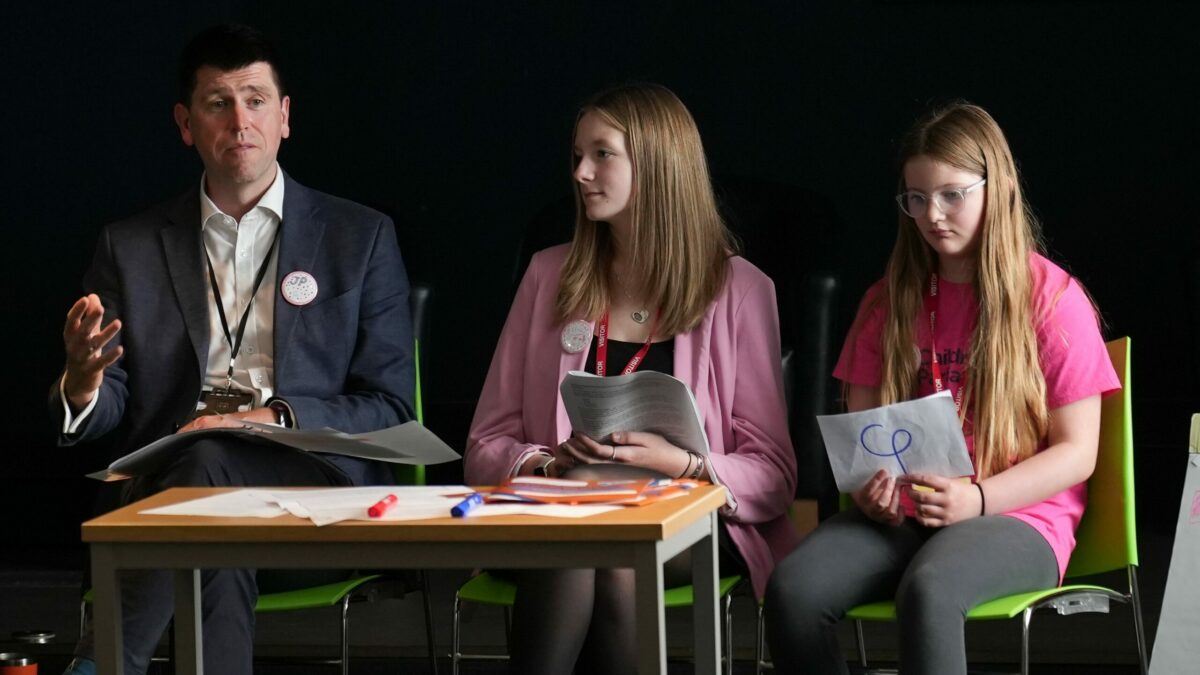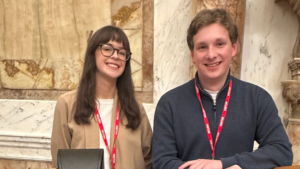At the Annual Children and Young People’s Executive Takeover 2024, Maya McCrae MSYP and Marianna Medina MSYP gave a speech to the Permanent Secretary, Directors-General and other civil servants on increasing mental health training and education.
Speaking after the event, Maya and Marianna said: “Being a part of Executive takeover was a fantastic opportunity to share the views of young people with senior civil servants from the Scottish Government. It was so inspiring to see how keen the directors were to involve young people in their work and we look forward to seeing how our conversations might influence their planning and decision making in the future.”
You can read our speech below:
Article 24 of the UNCRC states that children and young people have a right to the best possible health. This means that our government must provide good quality mental healthcare and education for young people to ensure that our rights are being upheld. This right is not currently being met for many young people in Scotland.
Why? Half of all mental health problems in Scotland start by the age of 14. If that wasn’t shocking enough, a staggering 75% of young people in Scotland don’t know where to go to access mental health support. Further, research has highlighted inequalities that exist in mental healthcare and experiences, particularly for rural young people in Scotland.
Following the incorporation of the UNCRC into Scots Law, the Scottish Government must now strive to improve and build upon the mental health support they currently provide to ensure our UNCRC rights are met.
We understand that this is a complex issue. We believe one solution to this problem would be for the government to support young people by reaching out to the adults in their lives, such as teachers, healthcare workers, parents and carers. Young people are often advised to speak to a ‘Trusted Adult’ if they are struggling with their mental health. However, many adults do not know how to support a young person who has described their mental health concerns to them or know where to direct the young person to for further support.
This brings us to why we’re here today. Our calls to action recognise that complex issues require pragmatic solutions. We hope that you’ll agree that what we’ve come up with is realistic and achievable.
Our policy, voted on by thousands of young people, says that “The Scottish Government should provide mandatory training and education for those working in education and healthcare settings on how to identify mental health problems and provide support for all young people,” but in order to achieve this, we need to see:
- Better signposting to existing training and educational resources
- Further development of resources designed by young people
- Support for adults to complete the training is essential to better support Scottish young people.
In 2017, SAMH reported that 66% of teachers did not feel they had received sufficient training in mental health to allow them to carry out their role properly. We are aware that this statistic is now 7 years old and the Scottish Government has since developed training & educational resources which can be delivered to both young people and adults. One of example of this is the Children & Young People’s Mental Health Professional Learning Resource which takes a whole school approach centred around prevention and early intervention to promote positive mental health and wellbeing for everyone in the school community.
We do not know how many teachers have accessed this training. However, in our experience many teachers still do not know how to support their student’s mental health suggesting they have not completed this training or do not know how to access it.
The Children & Young People (Scotland) Act places a ‘duty on schools and local authorities to safeguard and promote the welfare of all Children’, but how can we ensure this is upheld when many teachers do not know how to support their students with their mental health? There needs to be better advertising and signposting to increase awareness of these resources if we are to decrease the level of mental health & wellbeing related issues in Scotland.
Resources used by young people and those who support young people should be developed by young people. There should always be scope for young people to be involved in the creation of educational resources, as we know what we need. Including us in these projects helps to ensure that the tools made are relevant, accessible and useful.
We were part of phase 3 of the development of ‘Mind Yer Time.’ This is an online resource that has been designed by Children’s Parliament and the Scottish Youth Parliament to help young people use their screentime wisely. Phase 3 was a great opportunity for us to share our input on what would be beneficial to include on the website, including adding a new section on body image.
The great thing is, that young people enjoy being involved! I‘ve loved contributing to the development of these resources. It provides us with the chance to feel seen and heard, which is incredibly important. It’s motivating to see our ideas come to life, and it’s rewarding to know that our input is valued.
In an ideal world, all adults working with young people would be fully trained in dealing with mental health & wellbeing related issues, but this simply isn’t the case. The COVID-19 pandemic worsened Scotland’s mental health crisis, particularly among young people. With the increase in demand for mental health support, we fear that teachers, youth workers, health care professionals, the list goes on, aren’t receiving enough time and support at work to complete the essential training required for their role as a ‘Trusted Adult’.
When I’ve consulted with young people about this issue, many brought to my attention that it was sometimes hard to speak to their guidance teacher about any issues they were experiencing because as well as being a guidance teacher, they also had regular classes to teach. This meant for the young people I was speaking to that their teacher wasn’t always able to prioritise their needs and offer them support.
How can we ensure trusted adults can fulfil that role properly, if they don’t have the time to be trained to do it?
We believe you could help address this by providing funding to support teachers to complete this training, and for the training to be reviewed regularly.
Our mutual goal is that young people, and adults in Scotland feel emotionally supported throughout all aspects of their life, and we’re only able to ensure that if our young people have access to trusted adults who are equipped to nurture their needs.
We absolutely recognise the hard work and investment that the Scottish Government has committed to this issue. We understand that what we’ve proposed may not be achieved overnight. However, to uphold Article 24 of the UNCRC, we believe our calls to action are the best way forward.


